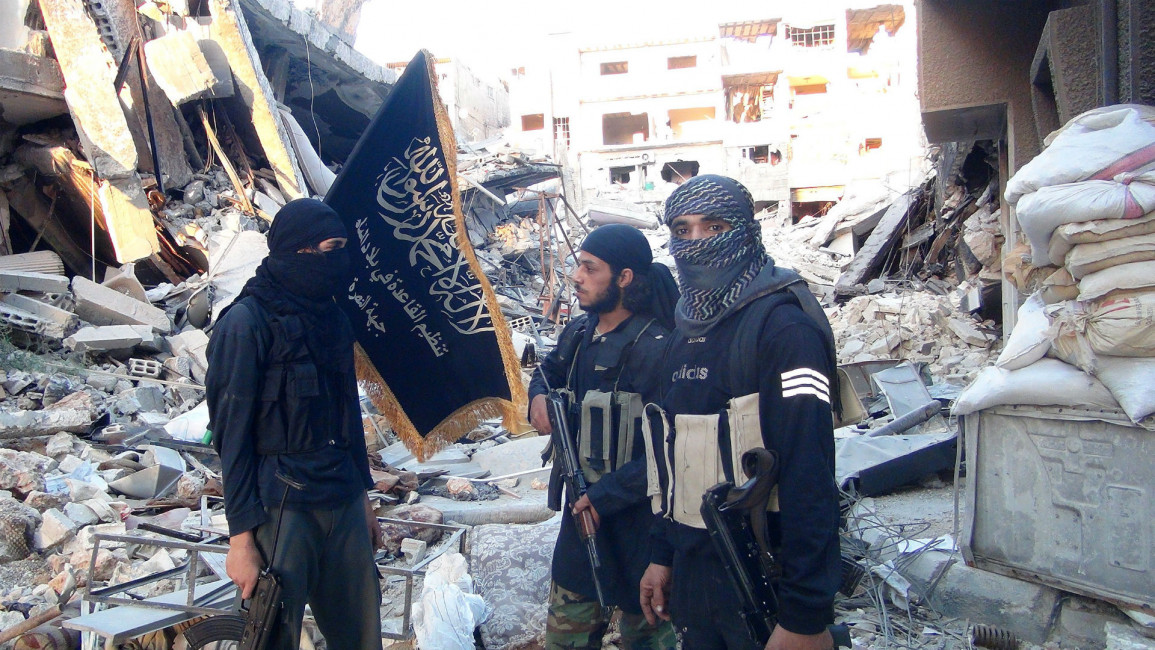Al-Qaeda in Syria losing ground amid fierce rivalries
Al-Qaeda's branch in Syria is in retreat for the first time since its dramatic rise in 2012, fighting for survival in Eastern Ghouta and battling rival militant groups in the north.
Already beset by infighting and assassinations which have taken out some of its top leaders, the extremist group has been driven from nearly all of the northern province of Aleppo in the past three weeks.
The group has lost dozens of fighters in battles there and in nearby Idlib province.
While the US-led coalition and Russian-backed Syrian regime forces have focused on driving the Islamic State from the country's east, the al-Qaeda-linked coalition known as Levant Liberation Committee has consolidated its control over Idlib, where it remains the most powerful force with thousands of fighters.
The group's presence in northern Syria and the besieged Damascus suburbs of Eastern Ghouta has provided a pretext for Syrian regime and Russian forces to wage war on opposition territory.
Several hundred al-Qaeda fighters holed up in Eastern Ghouta have become a burden to the armed opposition battling regime forces there, which has pressured the extremists to leave for Idlib in order to avoid the current crushing offensive.
 |
Already beset by infighting and assassinations which have taken out some of its top leaders, the extremist group has been driven from nearly all of the northern province of Aleppo in the past three weeks |  |
The recent fighting appears to have been triggered by last month's assassination of a senior al-Qaeda official, Abu Ayman al-Masri, who was riding in a car with his wife when members of a rival militant group, Nour el-Din el-Zinki, fired on their vehicle, killing al-Masri and wounding his wife.
The killing led to battles in Aleppo and Idlib that have raged for the past three weeks.
The shooting was preceded by the merger of Nour el-Din el-Zinki and the ultraconservative Ahrar al-Sham, both former al-Qaeda allies now turned enemies.
Amid the recent battles, the new coalition, the Syria Liberation Front, has forced the al-Qaeda fighters to retreat west to Idlib.
The insurgents say that the war against al-Qaeda will not stop until the group is crushed in Syria - an ambitious goal.
It is also a striking statement, considering the rival groups once turned to al-Qaeda's experienced and battle-hardened fighters for support in the battle against Assad’s forces.
Yazan Mohammed, a media activist based in Idlib province, said that although al-Qaeda has lost some territory in the recent fighting, the group is far from being defeated.
The al-Qaeda fighters are "not scouts. They are an organised and powerful group," Mohammed said.
'Mission impossible'
In recent years, tens of thousands of rebels and civilians from around the country have fled to Idlib or been forced there by regime troops, raising concerns that the presence of al-Qaeda will give the regime a pretext to storm the province under the cover of Russian airstrikes as it has elsewhere, including in Aleppo in late 2016 and in the current offensive in Eastern Ghouta.
 |
|
| Click here for our coverage of Eastern Ghouta |
Brett McGurk, the top US envoy for the coalition battling IS, said last year that Idlib is the largest al-Qaeda haven since bin Laden’s days in Afghanistan.
"This war will not stop," said Bassam Haji Mustafa, a senior official with the Nour el-Din el-Zinki group. "This is a real war against al-Qaeda, its extremist ideas and terrorism."
After the recent battlefield losses, a senior al-Qaeda commander, Abu Yaqzan al-Masri, released an audio asserting the militant group will soon crush the offensive and the focus will again be "to fight infidels," an apparent reference to the West.
The commander's comments coincided with a counteroffensive in which the al-Qaeda affiliate regained some villages it had lost earlier, although its presence in Aleppo province has almost ceased to exist.
Local activists said the al-Qaeda counteroffensive was backed by members of the Turkistan Islamic Party, a powerful group consisting mostly of militants from China’s Turkic-speaking Uighur minority.
The Britain-based Syrian Observatory for Human Rights, which tracks Syria's seven-year conflict, says the fighting that broke out on 20 February has killed 223 fighters on both sides, including 132 from al-Qaeda's affiliate.
Despite losing dozens of villages in the recent battles, it is unlikely that al-Qaida will be defeated easily in Idlib, where the militants have crushed many of their opponents in recent years.
"They will not be able to defeat the Committee," said Abu Dardaa al-Shami, who sometimes fights with the al-Qaeda affiliate but refused to take part in the current battles, saying he only fights against government forces.
"This is mission impossible," he said.


![Minnesota Tim Walz is working to court Muslim voters. [Getty]](/sites/default/files/styles/image_684x385/public/2169747529.jpeg?h=a5f2f23a&itok=b63Wif2V)




![Debris near Rafic Hariri International Airport [Getty]](/sites/default/files/styles/image_330x185/public/2176162423.jpeg?h=a5f2f23a&itok=MCSK9mkM)
![An Israeli air strike on Jabalia killed teenage journalist Hassan Hamad [Screengrab/X]](/sites/default/files/styles/image_330x185/public/2024-10/hassan%20hamad1.jpg?h=c12e0b96&itok=Rd_dyCVp)
